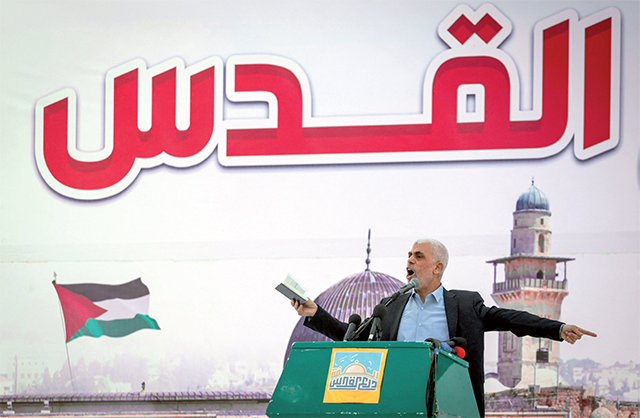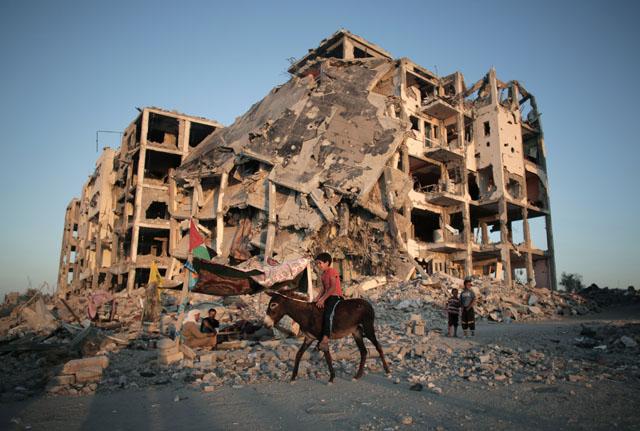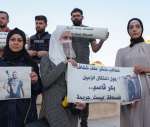You are here
Yahya Sinwar: Hamas Gaza leader and ‘dead man walking’
By AFP - Dec 01,2023 - Last updated at Dec 01,2023

Yahia Al-Sinwar (C), the Gaza Strip chief of the Palestinian Islamist Hamas movement, addresses supporters during a rally marking Al-Quds Day, a commemoration in support of the Palestinian people celebrated annually on the last Friday of the Muslim fasting month of Ramadan, in Gaza City, on April 14 (AFP photo)
GAZA STRIP Palestinian Territory — After a career in the shadows, spent in Israeli prisons and the internal security apparatus of Hamas, Yahya Sinwar rose to lead the Islamist movement in the Gaza Strip.
Now, Israeli officers say, he is a “dead man walking”.
Sinwar stands accused of masterminding the group’s October 7 sudden attacks, the worst in Israel’s history, which officials say left around 1,200 people dead and about 240 dragged back to Gaza as hostages.
It was probably a year or two in the planning, “took everyone by surprise” and “changed the balance of power on the ground”, said Leila Seurat of the Arab Centre for Research and Political Studies (CAREP) in Paris.
The ascetic 61-year-old has not been seen since October 7. Known for his secrecy, Sinwar is a security operator “par excellence”, according to Abu Abdallah, a Hamas member who spent years alongside him in Israeli jails.
“He makes decisions in the utmost calm, but is intractable when it comes to defending the interests of Hamas,” Abu Abdallah told AFP in 2017 after his former co-detainee was elected Hamas’s leader in Gaza.
Punishing collaborators
After October 7, Israeli military spokesman Lieutenant Colonel Richard Hecht called Sinwar the “face of evil” and declared him a “dead man walking”.
Born in the Khan Yunis refugee camp in southern Gaza, Sinwar joined Hamas when Sheikh Ahmad Yassin founded the group around the time the first Palestinian intifada began in 1987.
Sinwar set up the group’s internal security apparatus the following year, and went on to head an intelligence unit dedicated to flushing Palestinians accused of providing information to Israel.
A graduate of the Islamic University in Gaza, he learned perfect Hebrew during his 23 years in Israeli jails, and is said to have a deep understanding of Israeli culture and society.
He was serving four life terms for the killing of two Israeli soldiers when he became the most senior of 1,027 Palestinians released in exchange for Israeli soldier Gilad Shalit in 2011.
Sinwar later became a senior commander in the Ezzedine Al Qassam Brigades, the military wing of Hamas, before taking overall leadership of the movement in Gaza.
While his predecessor had encouraged efforts by Hamas to present a moderate face to the world, Sinwar has preferred to force the Palestinian issue to the fore by more violent means.
Gaza’s Hamas government says Israel’s withering aerial and ground assault has killed nearly 15,000 people in the Palestinian territory, most of them civilians.
‘Radical and pragmatic’
Sinwar dreams of a single Palestinian state bringing together the Gaza Strip, the occupied West Bank, controlled by President Mahmoud Abbas’s Fateh party, and occupied East Jerusalem.
According to US think tank the Council on Foreign Relations, he has vowed to punish anyone obstructing reconciliation with Fateh, the rival political movement with which Hamas engaged in factional fighting after elections in 2006.
That coming together remains elusive, but the prisoner releases resulting from the current truce agreement with Israel have seen Hamas’s popularity soar in the West Bank.
Sinwar has pursued a path of being “radical in military planning and pragmatic in politics”, according to Seurat.
“He doesn’t advocate force for force’s sake, but to bring about negotiations” with Israel, she said.
The Hamas chief was added to the US list of the most wanted “international terrorists” in 2015, as was Mohammed Deif, the current commander of the Ezzedine Al Qassam Brigades and another alleged October 7 mastermind.
Security sources outside Gaza say that both Sinwar and Deif have taken refuge in the network of tunnels built under the territory to withstand Israeli bombs.
Vowing earlier this month to “find and eliminate” Sinwar, Israeli Defence Minister Yoav Gallant urged Gazans to turn Sinwar in, adding “if you reach him before us, it will shorten the war”.
Related Articles
GAZA CITY — Hamas elected in secret a hardline member of the Palestinian Islamist movement's armed wing as its new Gaza leader on Monday, in
Israeli assassination attempts may have left him badly hurt and driven him deep underground, but Mohammed Deif, the shadowy leader of Hamas’ armed wing in the Gaza Strip, has emerged as a mastermind of the war with Israel.
Mohammed Deif, the shadowy leader of Hamas' armed wing in Gaza, appears to have narrowly survived a fifth attempt to assassinate him, allowing the mastermind of the six-week war on Israel to pursue the conflict from his network of tunnels.


















